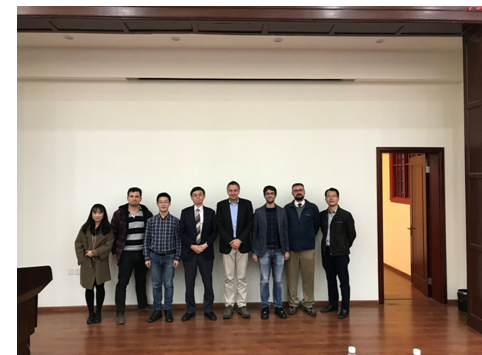2018年11月30日,应bwin必赢邀请,日本东京工业大学Munetaka Akita教授、德国雷根斯堡大学Burkhard König教授和英国曼彻斯特大学Daniele Leonori教授来我院参加光化学研讨会,在化学馆321报告厅分别做了题为“Fluoroalkylative Olefin Difunctionalization by Photoredox Catalysis”、“Let there be light: Organic Synthesis with Photocatalysis”、“Photoinduced Generation of C–N Bonds”的学术报告。此次研讨会由bwin必赢余达刚教授主持,Jason J. Chruma教授、余志鹏教授、董顺喜教授、付海燕教授等老师及学生参加了报告会。
在研讨会中,三位专家分别对他们在光化学领域所做的杰出工作和心得体会进行了精彩的展示。其中,MunetakaAkita教授主要介绍了-光催化烯烃的氟烷基化官能团化(例如烯烃的胺化三氟甲基化反应)领域的研究进展;Burkhard König教授介绍了两代连续光致电子转移(ConPET)催化剂的性质应用以及他们借助光催化手段实现的C-F键断裂、羧化反应等反应的研究进展;Daniele Leonori教授介绍了他们发展的两类作为氮自由基前体的羟胺衍生物及其参与的C-N键转化研究进展。三场报告内容丰富,专家们讲解形象生动,深入浅出,使师生对光化学领域有了更加深入地理解。在随后的自由提问环节,在座师生与专家们就光化学领域的问题进行了热烈地讨论交流。报告在热烈的掌声中落下帷幕,结束后部分老师与专家们合影留念。

Prof. Dr. Akita got his Bachelor in 1979 and Master degree in 1981 both from Kyoto University (Prof. Makoto Kumada and Prof. Kohei Tamao). In 1984 he got his Ph. D. from Osaka University with Profs. Akira Nakamura and Hajime Yasuda. Then he became assistant professor in Tokyo Institute of Technology (TIT). During 1989-1990 he did postdoctoral research at the University of Illinois at Urbana-Champaign (Prof. J. R. Shapley). Then he went back to TIT and promoted to associate professor in 1995 and full professor in 2002. His research interests mainly include: 1) Catalytic Reactions Promoted by Visible Light; 2) Organometallic Polycarbon Species: Application to Molecular Devices; 3) Photochromic Organometallics. He has published more than 160 papers and involved in many scientific activities, including the head of organometallic section, Catalysis Society of Japan; Editorial Board of Chemistry Letters; Section Editor, Bulletin of the Chemical Society of Japan; Editorial Advisory Board of Organometallics and Dalton Transactions.
Prof. Dr. König was born in Germany. He received his Diplom in Chemisty in 1988 and PhD degree with Prof. Armin de Meijere in 1991 both at University of Hamburg. He was a visiting research fellow with Prof. Martin Bennett at Australian National University (1991-1992) and became a Postdoctoral fellow with Prof. B. M. Trost at Stanford University (1992-1993). Then he went back to Germany and was appointed as assitantant professor at the Technical University of Braunschweig. In 2000 he became full professor at University of Regensburg. His current research interests focus on the development of synthetic receptors for the recognition of biological target structures and the application of visible light chemical photocatalysis for organic synthesis. He published more than 360 papers, patents and book chapters. Prof. König received many awards, including Chairman of the National Organic Chemistry division (2008 – 2012); UN-Decade Award on Sustainability 2011/2012; Editorial board member of “Chemistry – A European Journal” and “European Journal of Organic Chemistry (Chair) (since 2014); ERC adv grant 2016; Reinhard-Koselleck grant of the German Science Foundation (2017).
Prof. Dr. Leonori received hisMSc in Universita’ degli Studi di Perugia, Italy andPhD from University of Sheffield in UK (Supervisor: Prof. Iain Coldham). Then he worked as a postdoctoral fellow and research associate with Prof. Magnus Rueping in RWTH-Aachen University from 2010 to 2011, with Prof. Peter H. Seeberger in Max Planck Institute for Colloids and Interfaces from 2011 to 2012 and with Prof. Varinder K. Aggarwal FRS in University of Bristol from 2012 to 2014. Then he was appointed as Lecturer in University of Manchester in 2014 and promoted to Reader this year. His research interests include Visible-Light-Promoted Photochemical Reactions and Strategies for the C–N Bond Formation. He has published more than 40 papers and book chapters. He is also the recipient of many awards and honors, including Eli Lilly Postgraduate Prize (2009)?, Marie Curie Career Integration Grant (2014-2019), IUPAC/UNESCO/PhosAgro Green Chemistry Award (2015), Silver Medal - 2016 European Young Chemist Award (2016), EPSRC Early Career Fellowship (2017-2022), Thieme Chemistry Journal Award (2017), ERC Starting Grant (2018-2023) and Harrison-Meldola Memorial Prize (2018).
